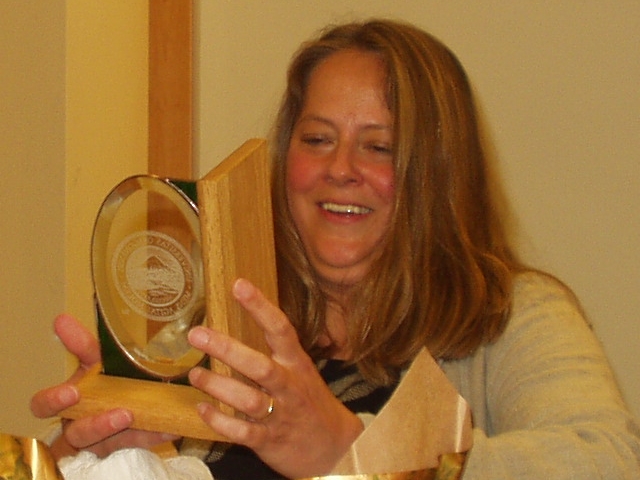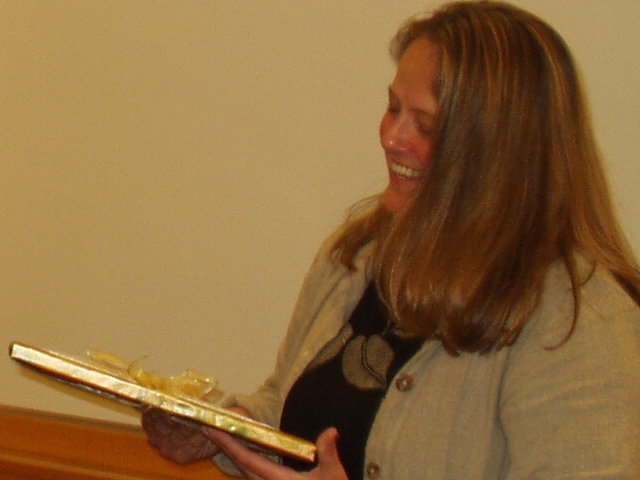

Well, this is the time for me to make my valedictorian comments before I ritually pass my gavel and copy of Roberts Rules of Order on to Andrew Marcus. As I look at my copy here, I cannot help but comment on the cover which Greg McLaughlan last year slipped beneath the plastic dust jacket and which reads "Roberts Rules of Order, Birth to Three." Needless to say, last year, seven months pregnant, I stared uncomprehendingly at what I knew was a joke, but which I didn't really get, since, being childless, I was even more clueless about that venerable Eugene institution for new families than I was about the complexities of motions, amendments, deferrals to committees, and other fine and less fine points of parliamentary order. The coming year, I surmised, was going to be a challenge. And indeed, in many ways, it has been; but of course not only have the rewards far outweighed the stress, but there have been several staunch pillars of support to whom I have been able to turn for sage advice along the way. So, before I make some final comments, I would like extend my heartfelt thanks to a few people without whom this job would have been near impossible and surely less fun: Gwen Steigelman is not only the power that keeps the Senate machinery running so smoothly, but she has also been an inestimable source of balanced wisdom on a host of matters from proper procedure to understanding the nuanced implications of motions; Nathan Tublitz, outgoing chair of this year's FAC, has been unstintingly generous with his time, advice, and advocacy for faculty and staff‹and I have taken full advantage of his tireless commitment to campus governance by asking him to weigh in on countless matters; and Andrew Marcus who comes to the job of Senate President with the seasoned experience of one who, as Vice-President, committed substantial time to governance issues both officially on committees, and with his always ready and sound advice. I am also very grateful to Peter Gilkey not only for all his masterful maintenance of the Senate website, but more importantly for his tireless work as IFS President and head of the Eugene chapter of the AAUP with which the Senate collaborated on several panel discussions. Finally, Paul Simonds, as Senate Parliamentarian, has kept me honest in the sometimes daunting and Byzantine complexities of Senate procedure. My profuse thanks goes to all these individuals.
As I stand back and survey the issues that the Senate confronted this year, I think that the dominant theme running through them all is the importance of wide consultation, open discussion, and the canvassing of several perspectives before important decisions affecting the campus community are made. It is precisely this atmosphere of inclusiveness, open debate, and critical thinking that we encourage in our classrooms, and that we emphasize to our students as the hallmark of healthy political systems. And yet, too easily in what is increasingly a culture of specialization, a culture particularly pronounced in academe, it happens that major decisions affecting many can be made by just a few, without the benefits of a deliberative process, simply because it may save time, expense, and the anxiety stirred by critical voices. But that polyphony of opinions is precisely what can provide the strongest context for positive action; indeed, we all recognize that it is the unexpected angle, the neglected data, the surprising and enlightening arrangement of the pieces of a particularly thorny problem that often opens up new vistas in our research. What is also true is that paying attention to many different voices in a governance context provides exactly that benefit of the unexpected perspective, the novel approach, and the fresh vision, to the running of a university. Of course I concentrate here on the benefits and practical wisdom of wide consultation and open deliberation; it is also a political responsibility that all those who participate in the institution of the university should have some kind of voice in how affairs are run.
This academic year began with two issues that are rooted in economic and ideological conditions that run much more deeply than the university itself. The role of intercollegiate athletics and its dependence on private donation and market forces was one of those issues; the other was the university's relationship to federal policy in regard to civic liberties and the right to privacy, an issue which came to a head over revisions to the Student Records Policy. In both these areas the academic year began with members of the university community feeling that the appropriate political processes of wide consultation and open deliberation had not sufficiently taken place; but such was the strong commitment to the principle of those processes that we now have, in the case of the Student Records Policy, not only a much stronger document that attends as far as possible to the privacy rights of students, but also an official university policy statement that articulates that respect for the civic liberties of all members of the university community. And what I wish to stress here is that this was the collaborative work of many different voices‹students, administrators, and faculty‹who committed to the process of critical inquiry and open deliberation in order to craft the strongest possible document and statement on the critical issue of privacy and federal subpoenas.
On the issue of athletics, it has of course been a rollercoaster year for the entire university. But here, too, after a demoralizing fall quarter in which the appropriate process for campus planning had not been fully pursued in the case of the basketball arena, the principle of consultation and deliberation did return in the Senate's involvement with the President's Task Force on Athletics and the "focus-groups" organized around concepts of athletic reform and best practices as outlined in the Coalition on Intercollegiate Athletics' Framework document. Not only did the Senate vote to join COIA, a significant endorsement of and commitment to this grass roots effort toward moderate national reform, but also the results from the focus-group discussions were transformed into explicit recommendations for action by the President and the University Senate. Here, again, by allowing for, and most crucially, listening to, a wide spectrum of opinions in a deliberative framework committed to moving forward on these issues, members of the Task Force achieved a very strong set of commonly endorsed goals. One of the most significant recommendations was for the Athletic department to make voluntary contributions to student scholarships; at a time when academics at the university is suffering from ever decreasing support from the state and an increased reliance on tuition dollars that fluctuate with enrollments, such a contribution makes not only a significant symbolic statement about the commitment of athletics to the educational mission, but it also makes a real difference to needy students.
Another issue that the Senate focused on this year in conjunction with the AAUP is the effects of the Patriot Act and other federal legislation on the treasured concept of academic freedom. At a co-sponsored panel discussion in March, panelists from the university, from the ACLU, and from the federal (local?) district attorney's office gave their differing perspectives on such concerns as subpoenas of library records, the difficult status of international students, the changes in SEVIS-the Student and Exchange Visitor Information System, and the elusive implications of the Patriot Act itself. Again, the principle of open discussion allowed for greater clarity about an area that is obscured by myth, anxiety, and the very real mystifications of complex laws. At a time when some organizations are encouraging students to maintain websites listing professors whose teaching is branded as Œleft-wing,' or when legislation is considered in Congress to curtail Title VI funding to "area" or postcolonial studies programs that teach courses critical of American international policy, or when the federal government seeks the names and other information about participants in an anti-war conference, as occurred at Drake University, it is clear that the principle of academic freedom must not only be protected but that it must assert itself in the process of ensuring that protection: the liberty to discuss, debate, critique, and deliberate across the entire ideological spectrum is precisely what must be deployed to ensure that such freedom continues. Thus, such panel discussions as we had in March, and the resolution petitioning our Congressional delegation to seek revision of the Patriot Act and related orders, are only a start in what ought to be an on-going effort to rigorously defend the university as a sacred place for open, unfettered inquiry.
Indeed, faculty and university community members should not take what they do and enjoy for granted. To move back from the national to the local, or perhaps I should say state, level, most of you are probably aware that there are significant potential changes for the OUS system currently being discussed in Salem. As the head of the Interinstitutional Faculty Senate, Peter Gilkey, and IFS representatives Nathan Tublitz and Jim Earl, have reported in previous Senate meetings, there is an effort to promote a "more efficient delivery of education for a greater number of students." The working group on "Excellence in Delivery and Productivity" backs this effort with a series of recommendations that may become legislative concepts or policy packages. While this effort is on the surface something that no one would argue with‹more students getting educated‹there are components to it that faculty should become familiar with so that their input can provide the necessary oversight to what could transpire as curricular changes being mandated from the top-down. Faculty should rightly be wary of initiatives that employ the lexicon of the business world, treating education exclusively as a market product and students as potentially fickle consumers, where the intent is to do more with less, a concept that increases profits for corporations and dividends for stockholders, but a very problematic concept in the abstract field of knowledge. Of course, in our current climate of scarce money for public education, we may not have the luxury to disregard some of these financially savvy business approaches. But what faculty should and must do is become familiar with these approaches and their implications, and demand to be the deliberative voice in any process that may seek to change the fundamental nature of how higher education is conducted. And, finally, if it is the responsibility of faculty to find the time for such service amidst their busy schedules devoted to research and teaching, it is equally the responsibility of administrators not only to recognize that a consultative approach makes for sound decisions, but also to recognize that the service devoted to such open discussion and deliberation takes considerable time and thought and needs to be acknowledged‹and rewarded‹along with teaching and research as indispensable to the environment of higher education.
No doubt many of the issues that came up this year will continue to need attention. To indulge in one last reflection on having taken up this job as a new mother, I soon realized in the fall, that there were some similarities between being Senate President and taking care of a newborn: there were some issues which, as soon as I thought that I had successfully put them to sleep in the nursery and was tiptoeing out of the room, began to cry to be picked up again. So it goes. Thank you all for a great year. Andrew Marcus, who will step into the presidential shoes momentarily, will do a terrific job.


| Web page spun on 27 May 2004 at 12:34 by Peter B Gilkey 202 Deady Hall, Department of Mathematics at the University of Oregon, Eugene OR 97403-1222, U.S.A. Phone 1-541-346-4717 Email:peter.gilkey.cc.67@aya.yale.edu of Deady Spider Enterprises |